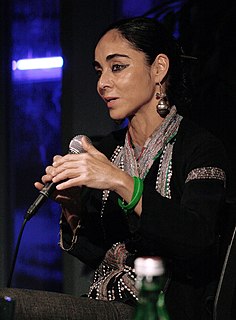A Quote by Shirin Neshat
Art is our weapon. Culture is a form of resistance.
Related Quotes
The subject of contemporary art should include a political dimension, the distrust contemporary art has towards the existing order. One manifestation of this distrust is the mechanical dichotomization between art's form and its political content; the other is the institutionalizing tendency of anti-institutionalization. We almost never resist ourselves - the part of ourselves that has been institutionalized. We have occupied the word "resistance" and have become its owner, while "resistance" has become our servant. Thus, we own "resistance" and occupy it as a position of power.
Man's greatest advances are weapon advances. Culture follows from weaponry, we are militant like the animals and birds - defending our homes. No matter how far back you go in history, along with the struggle for existence, along with the survival necessities - kill or be killed, eat or be eaten - there is a hunger for something spiritual. He invents God, prayers, incantations to something above him. Why? This is not brought out - this is not weapon culture.
I say to myself, go on seeking, be glad for being sensitive, be glad you're able to go beyond the resistance inside you. It is our resistance to what we experience that makes creativity possible. So don't get rid of resistance like that by going around it or trying to eliminate it. Our own limitations put up strong resistance, but it's because of that that we are creators
All inner resistance is experienced as negativity in one form or another. All negativity is resistance. In this context, the two words are almost synonymous.
Negativity ranges from irritation or impatience to fierce anger, from a depressed mood or sullen resentment to suicidal despair. Sometimes the resistance triggers the emotional pain body







































